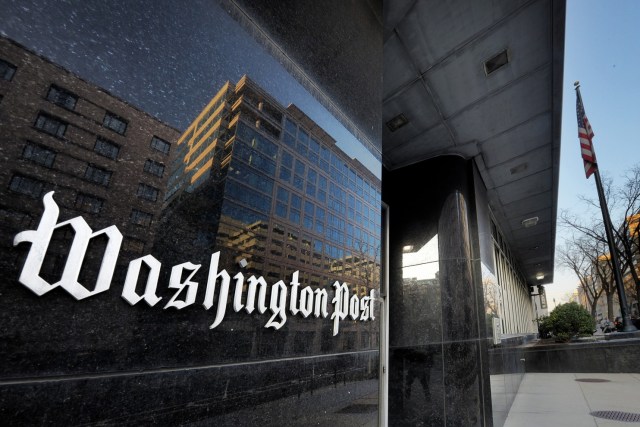
El diario estadounidense The Washington Post dedicó hoy un duro editorial al Gobierno de Nicolás Maduro en Venezuela, en el que aseguró que la situación en el país requiere de forma “desesperada” la intervención política por parte del resto de Estados americanos.
En la pieza, titulada “Venezuela requiere desesperadamente una intervención política”, la mesa editorial del prestigioso diario de la capital de EE.UU. apela a la Carta Democrática Interamericana aprobada por la Organización de Estados Americanos (OEA) como mecanismo para proteger la democracia en la región.
El editorial es muy duro con el régimen bolivariano, al que acusa de haber “llenado ilegalmente” de simpatizantes el Tribunal Supremo de Justicia y le responsabiliza directamente de que Venezuela se esté acercando a un “colapso calamitoso” en el que en las tiendas faltan “comida y medicinas básicas”.
“El Gobierno está a meses vista de entrar en incumplimiento de pagos. Los cortes importantes de agua y electricidad se han multiplicado en las últimas semanas. La inflación está en cifras de tres dígitos y el crimen violento se está disparando”, describe el Post la situación en el país caribeño.
Además califica la medida del Gobierno de Maduro de reducir a cuatro días la jornada laboral de los empleados públicos de “sinsentido” y le acusa de haber iniciado una guerra con la Asamblea Nacional (de mayoría opositora) “pese al incremento del sufrimiento de los venezolanos”.
El editorial critica que el Tribunal Supremo haya “desnudado” a la Asamblea Nacional de sus poderes constitucionales tumbándole cada medida aprobada y menciona como ejemplo la ley de amnistía que hubiese liberado a 76 activistas de la oposición.
Según los editorialistas, el rechazo de la corte a liberar a los presos, entre los que menciona específicamente el caso de Leopoldo López, fue “ridículo” desde un punto de vista legal.
Pese a pedir intervención exterior, el Washington Post lamenta que los líderes regionales “estén distraídos”, con Brasil “con su propia crisis política” y el Gobierno de EE.UU. dirigido por Barack Obama “preocupado por sus compromisos con Cuba”.
“Mientras la Casa Blanca corteja a los Castro, estos usan su control sobre la inteligencia y fuerzas de seguridad venezolanas, y su acólito Maduro, para fomentar sus tácticas kamikazes. Probablemente no tardará en llegar una explosión”, concluye el editorial, reseña Efe.
Venezuela is in desperate need of a political intervention
AN OPPOSITION victory in parliamentary elections in December gave Venezuela a fragile opportunity to arrest what has been an accelerating spiral toward an economic and political crash. Had it chosen to accommodate and negotiate with opposition leaders, the deeply unpopular government of Nicolás Maduro might have been able to ease mounting political tensions and build consensus around desperately needed economic stabilization measures. It was urged to pursue this course by the Obama administration and most Latin American governments, with the notable exception of its closest ally, Cuba.
Unfortunately, the regime has pursued scorched-earth warfare with the National Assembly, even as the hardships suffered by ordinary Venezuelans mount. Having been illegally packed with government supporters before the legislature took office, the Supreme Court has proceeded to strip the opposition majority of its constitutional powers and reject every measure it has passed. The latest, on Monday, was an amnesty bill that would have freed76 opposition activists, including three senior figures whose release is the essential starting point for political reconciliation.
Like every other ruling it has issued, the court’s rejection of the prisoner release was ludicrous in its lack of legal sense. The justices claimed that the prisoners’ release would be unfair to victims of violence in anti-government demonstrations two years ago. But as human rights groups have extensively documented, most of that bloodshed, including 43 deaths, was committed by the regime’s security forces; far from engaging in violence, opposition leaders made speeches against it. No matter: Leopoldo López, the top politician being held, was sentenced to nearly 14 years for allegedly sending “subliminal messages” of incitement.
Apart from the crude violation of the rule of law, Mr. Maduro’s commitment to confrontation matters because Venezuela, a country of 30 million people with some of the world’s largest oil reserves, is approaching a calamitous breakdown. Shops are empty of basic foods and medicines, and the government is within months of a foreign debt default. Severe water and electricity shortages have spread in recent weeks; inflation is in triple digits, and violent crime is soaring. The government’s only response has been nonsensical measures, such as decreeing a four-day workweek for all public employees.
Opposition leaders are now pursuing the strategy of trying to legally unseat the government by collecting signatures for a recall referendum or passing a law shortening Mr. Maduro’s term. Almost certainly the regime’s minions on the Supreme Court and electoral authority will declare the initiatives void, regardless of their legality. Considering the people’s extreme privation, the chances of mass disorder are high.
Venezuela is desperately in need of political intervention by its neighbors, which have a ready mechanism in the Organization of American States’ Inter-American Democratic Charter, a treaty that provides for collective action when a regime violates constitutional norms. But the region’s leaders are distracted: Brazil is suffering its own political crisis, while the Obama administration is preoccupied with its outreach to Cuba. While the White House courts the Castros, they are using their control over Venezuela’s intelligence and security forces, and longtime acolyte Mr. Maduro, to foment his kamikaze tactics. An explosion is probably not far off.

